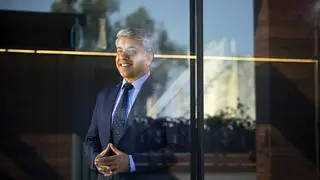You could say Anand Rajaraman has the Midas touch. After all, the IIT Madras and Stanford alumnus, along with his partner Venky Harinarayan, had invested $100 million in Facebook’s Series A way back in 2007 and seen it grow 2,000 times. The Junglee.com co-founder, who sold his first start-up — a shopping service — to Amazon, and the second, Kosmix — a social media data analysis firm — to Walmart, has teamed up with his old buddy Harinarayan and a few others to create Rocketship, a VC fund that uses data and machine learning to zero in on start-ups from all over the globe. Rocketship is midway through its Fund II, for which it raised $100 million — more than twice the $40 million it raised during Fund I. It typically invests in Series A and B rounds and averages a ticket size of $3 million. Excerpts from a chat with the Palo Alto-based investor, who was in Chennai recently:
Rocketship’s investments rely on algorithms. Why did you opt for the data route?
Typically the VC world works in a simple way. You build a network, and companies in that ecosystem would find you. This is how VC investing has been for over 30 years. Now the world is changing. There are interesting start-ups in hundreds of places all over the world. In 2013, there were only three ecosystems — Silicon Valley, China and New York — that produced unicorns. Today there are at least 80 ecosystems around the world that produce unicorns. It’s not possible for a VC to build a network in all the ecosystems. So the best approach is to use data. We have built a big database of companies. Then we use machine learning to alert us on the most interesting start-ups. We have our portfolio companies spread across Silicon Valley, Latin America, South East Asia, India and Europe.
What does the algorithm seek?
We track information on more than ten million companies. Who are the people in the company, who are the investors, how good are they at investing; if the company has an app or website, how many people are visiting and engaging through these. Plus the social media profile of the company. Is there any press coverage on the company? The model tracks all this stuff.
Does the algorithm also track the geopolitics of a country to see if money is safe?
No, it does not track that. That judgement we have to make. For instance, right from the beginning we have not invested in China.
What kind of companies are you investing in? What’s your portfolio in India like?
Pretty much all our investment is in technology companies. Technology defined in a broad way — could be B2B, infra, SaaS, fintech, etc. We have invested in more than a dozen companies in India. There is Khatabook (a digital ledger book app), Moglix (a B2B marketplace for industrial e-commerce), Locus (which is in the logistics optimisation space), and Apna, in the blue- and grey-collar workers space. We have a company called Animall, which is an app that serves dairy farms. One of the interesting themes, if you look at many of our portfolio companies in India, is that they are all serving non-elite markets — the Bharat market.
Apart from Rocketship, you have invested in your personal capacity too, right? In Kashyap Deorah’s movement tracking software firm Hypertrack, for instance?
Kashyap Deorah is a friend. I have invested in every single company he has built. Then, I have a personal investment in a company called Medibuddy. That comes from a programme where I sought to support entrepreneurship coming out of my alma mater IIT Madras. Way back in 2012, I gave a talk at IIT Madras. I asked the students how many wanted to be entrepreneurs? Very few hands went up. That stung.
That’s when we created the IIT Madras Entrepreneurship Fund. Anyone affiliated to the institution, whether students or faculty, could apply. A few interesting companies came out of that. One of them was Medibuddy. Today, they have 3,000 employees and I continue to invest personally and support them. Another company that came out of that model is HyperVerge (a deep learning startup).
You created two successful start-ups. Have you not had the urge to create another start-up?
Well, Rocketship is very much like a start-up. We are innovating within the VC space, using data, not focusing on one geography. In a way it feels like a start-up. We have a team of people working on data and algorithms.
But do you feel comfortable investing without actually meeting the people?
One of the things we developed early on was an ability to evaluate a company based on data and without doing physical meetings. Most people are not comfortable with that. But we are.
Apart from the usual Series A and B, we also occasionally do seed fundings. But the seed investments are mostly in the Silicon Valley, as in early-stage, we need to meet physically to evaluate.
Outside of Rocketship, how do you keep busy?
I teach at Stanford’s computer science department. I take a class on data mining. I love mentoring students.Then usual stuff like yoga, running... and I love watching cricket.
Any new trends in investments?
The Bharat trend I talked about is pretty exciting. No longer are the founders coming from Chennai and Bangalore and urban metros. Now our data throws up companies in Patna, Udaipur and even Rameswaram. For the first time, I got pitched to in Tamil. That kind of stuff is amazing.
And since I follow cricket, I must give a cricket analogy. If we think about Indian cricket today, no longer are the players from the top cities. Now there is depth.







Comments
Comments have to be in English, and in full sentences. They cannot be abusive or personal. Please abide by our community guidelines for posting your comments.
We have migrated to a new commenting platform. If you are already a registered user of TheHindu Businessline and logged in, you may continue to engage with our articles. If you do not have an account please register and login to post comments. Users can access their older comments by logging into their accounts on Vuukle.